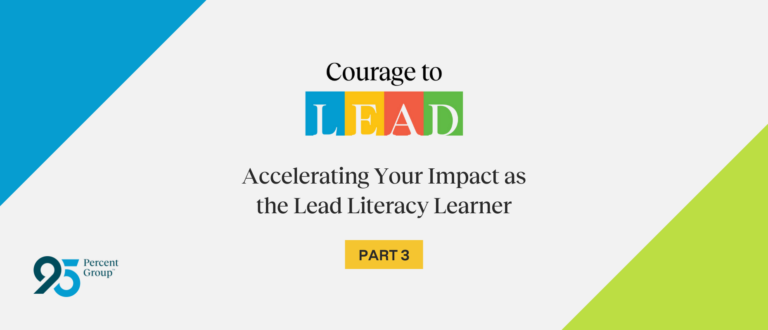Courageous leaders: Accelerating your impact as the lead literacy learner with Laura Stewart and Mitchell Brookins (Part 3 of 3)

In part 3 of our new post in the Courageous Leaders Webinar Series, Laura Stewart, Chief Academic Officer at 95 Percent Group, and educational consultant Mitchell Brookins, PhD, dive deep into the meaning of “leading from the heart” and the role of vulnerability and authenticity in nurturing trust.
Laura Stewart:
I heard you say this, and I wrote it down as a direct quote—”What comes from the heart reaches the heart.” Would you like to talk about that? I love that.
Mitchell Brookins:
I hope everyone can truly see that I’m serious about this. And I think when people realize it’s serious—he’s about eradicating illiteracy—they can feel my heart. I think that’s another piece that lets them know, “Oh, trust him.” When people take me on an instructional round or walk-through, and I walk into the classroom, and they see the first thing I’m doing is I’m hanging out with the kids and I’m asking the kids questions, they realize that I’m about children.
I definitely try to exemplify that because I think we’re also in this place that we’re trying to get people on board. They have to hear our stories. They have to hear our passion. They have to feel like what we’re doing and what you believe in—your life depends on it. And so I think that is the piece that I really try to emanate to them—this is from my heart, and I’m hoping it does get communicated.
And I’m not even afraid, Laura, to have conversations with principals in their most tough decisions and most vulnerable moments. When I say that phrase “what comes from the heart reaches the heart,” it’s also about me setting up those heart moments where the leader can be vulnerable, where the leader can share what’s truly on their mind. And that is because I think there is something that we don’t talk about enough. There are so many studies that show that leaders are dying, too. We put a lot of effort and say that teachers are stressed out and teachers are XYZ. And yes, teachers are. But principals are leaving in droves as well. And I think we don’t always realize that.
Sometimes, we put someone in that leadership position who is not ready. They are struggling, and there is no help, just like the teachers get no help. The principal is not being coached either. I know more principals who can’t lead the way they need to lead because they’re so afraid to tell their staff that they don’t know. They’re concerned that the staff is then going to say, “Well, then, why are you in this position? You shouldn’t be a leader. You shouldn’t have this. You shouldn’t be that.” And I hate that for these leaders, Laura, because there are some leaders who have leadership qualities, and they’re destined to be, and they need that support.
Laura Stewart:
I want to go back to this whole idea of the heart. I really believe that in vulnerability and in authenticity, trust will unfold. And in that space, sometimes we just do our best work. That’s where the relationship can drive the work that needs to be done.
Mitchell Brookins:
I appreciate that. We really need to think about this—the emotional well-being of our field. That’s why that heart piece is so crucial. Right now, sometimes it feels like people have lost their joy coming to work, and they’re not happy. We have so many teachers and even leaders who are barely making enough money to get by. And it seems like all we keep doing is adding more and more and more onto people’s plates. I wish we could get to this place where, as I told you earlier, we think about de-implementation.
Laura Stewart:
I’ve heard you talk about that before. Can you share what you mean by de-implementation?
Mitchell Brookins:
When we think about the well-being of our organization, of our field, we’ve got a whole lot of sickness, and I think a lot of the sickness comes from the fact that we’re just doing too much. We’ve got schools where we have Heggerty. We have Fundations. We have UFLI. We have PBIS. We’ve got a new carpool piece over here. We have so many things going on. I actually told a leader a week ago, “You got so much going on that if the school does improve, we won’t even know what made it happen.”
Laura Stewart:
That’s initiative overload. So, on this idea of “de-implementation,” how do you help people figure that out—the stop/start/continue approach? How do you help people make those choices?
Mitchell Brookins:
Once the choice around the high priority has been made, and we go through the discovery process—the audit—we decide, “this is the priority—we’re going to do this thing.” I then ask them to start reflecting on what they need to start, stop, continue so that we can do this thing. I spend more time in the stop because one thing I think that leaders are not doing sometimes is to really analyze their initiatives. They need to ask themselves which initiatives are causing harm to their organizational health. Whatever is causing harm needs to be destroyed. Cut it.
If your lesson plan template is driving your teachers crazy and they’re not functioning well, you may have to think about cutting…you need to spend more time cutting some things away so that people can have time…we talked about cognitive load theory for children. Let’s talk about the cognitive load for our adults and not do everything, especially when you’re in the initial stage of implementation of an effort. You gotta take something off teachers’ plates.
And I think the other piece of this I saw in one of the comments—someone talked about the weeds—you have to understand that if you want something to take root that you know is evidence-based, you can’t put it in the garden of weeds. You gotta pull the weeds from their root because you’re not making room for the initiative. It’s almost like schools are just cluttered. There’s so much clutter. So we need to start taking some things away. We need to pull the weeds away.
This is why, in my leadership coaching, we have to have what I call “step back meetings” where we think about these questions: Did we reach our goal? What got in the way of that goal? Those things that got in the way of the goal are probably the things that need to be stopped. I do not think we have enough leaders who have regular meetings where they are analyzing the impact of their initiatives and they are strategically saying, “This meeting is about cutting.”
Laura Stewart:
I think that goes back to a fundamental principle that transformation isn’t additive. Transformation is transformation. When we add things, that’s transactional, right? And we can’t just keep adding things because there is no teacher out there that has an extra 30 minutes a day that she just doesn’t know what to do with. So, let’s add more stuff, right? I think that takes courageous leadership to have those conversations because it is hard to pull some things out of the garden that people might love and they might have been using them for years, especially if they’re very good at it. But sometimes those things have to go because they’re not delivering the best results for our students, and something has to go, as you said, to make a place for something to come in. I also love what you said about this whole retrospective process. We have to be continually monitoring and reflecting and making next best steps based on that monitoring and reflecting.
Mitchell Brookins:
I think it’s really powerful how you said it’s not transactional, it’s transformational. I love that. People don’t understand what transform means. You’re not supposed to be the same. And so if you are putting things in place and nothing is changing, that’s the problem! I don’t care if you love that. That’s actually half the problem in our field is that we are a field that’s not acting as if we have a knowledge base. We’re acting on opinions and beliefs and philosophies. I don’t care if you like it if it’s harming children.
If you love something, and there’s no results from it, you can’t just keep doing it. People have to make the decision. Do you want a proof point? Do you want results? Because the moment that you decide that you want results, the implementation is not a challenge.
Laura Stewart:
I do want to make sure we have time to ask you a fundamental question. As a person who clearly leads from the heart and as a person who is committed to your literacy leadership, what do you hope for most in this moment?
Mitchell Brookins:
Oh, that’s a very good question! I’ve been wrestling with this concept for a while that the tide is turning and I’ve been amazed, especially in this last year, to see the convergence of so many people coming together. And it feels like we’re not building a monument. We’re building a movement. It’s not about one person. It’s about a collective effort to do this work. And so one thing that I hope for the most, and I’m worried about it—I’ve told you before—I’m worried about infighting. I’m worried that in this moment where we’re about to start making traction, we’ve got people in our own community who are canceling each other, ripping each other apart, arguing as if we’re not all trying to do very similar work. So what I hope for in this moment is that as we build this movement, we understand that this is supposed to be about building a coalition, not canceling each other. It’s not about who’s right or wrong. It’s not about whose ego needs to be stroked. We can get to a place where practitioners can look at our thought leaders, they can look at our researchers, and they can get inspiration and direction and not the fighting.
And I know that it’s challenging, because the science of reading is a blessing and a curse. Right? It’s interdisciplinary. That means that everybody’s got their own worries. Everybody has their own thing that they’re focused on. In those moments, you can get very riled up if someone doesn’t talk about your topic.
I would love to see more roundtable discussions where practitioners can come together and actually talk about what are our disagreements. I think about the multilingual learner community and how we need to mesh those communities together so they understand that the science of reading community does care about oral language.
I think about the African American community and thinking of them feeling like the science of reading community may not be for them because it’s predominantly white. We need to be creating spaces where we can talk to them and say, it doesn’t have to be that way. And the researchers, if we’re still fighting over PA with letters versus not, strategy versus knowledge, we need to get together, and have those conversations to say, “We’ve got one cause.”
And so my biggest hope this moment, Laura, is this: As the tide is turning, we lock arms. We do exactly what I read about and watched in the videos that I’ve seen from the civil rights movement—we march on. We lock arms and we march on so that as a community, we can pay back that educational debt.
This movement, if we’re going to make it really take root, is going to take leadership.
About 95 Percent Group
95 Percent Group is an education company whose mission is to build on science to empower teachers—supplying the knowledge, resources and support they need—to develop strong readers. Using an approach that is based in structured literacy, the company’s One95™ Literacy Ecosystem™ integrates professional learning and evidence-based literacy products into one cohesive system that supports consistent instructional routines across tiers and is proven and trusted to help students close skill gaps and read fluently. 95 Percent Group is also committed to advancing research, best practices, and thought leadership on the science of reading more broadly.
For additional information on 95 Percent Group, visit: https://www.95percentgroup.com.



